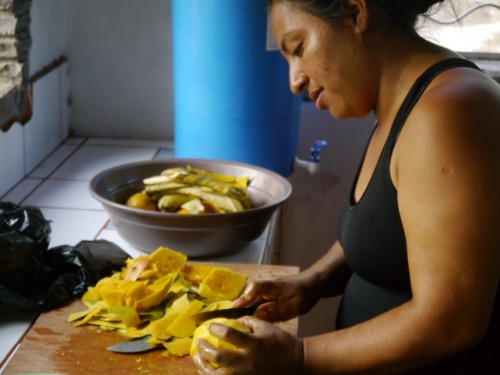
Food insecurity is always a threat in Nicaragua, the second poorest country in Latin America and the Caribbean, where two out of three rural people live on less than one dollar a day. Project Bona Fide’s Café Infantil (Children’s Café) addresses the health and nutrition of the some of the most impoverished and malnourished children living in Balgue, on the Isla de Ometepe off the coast of Nicaragua. Many of these children come from single parent households, almost all headed by women. Project Bona Fide has been an Imagine There’s No Hunger partner for over three years and has made great strides in improving the lives of children living in Balgue. Café Infantil provides healthy, nutritious meals to children between the ages of five and ten years old, though there are a few patrons who are much younger, starting at 13 months, and a few who are older than 12 years.

Marina is the amazing woman who helped found the Café in conjunction with Project Bona Fide. Marina is a ball of energy, never without a smile, constantly engaging with mothers, children, and volunteers, currently coordinating and managing the café. Before Café Infantil had its own building, Marina’s home served as one of two feeding sites for the community. During the site visit with WhyHunger and Hard Rock Café staff in June 2013, Marina stressed the importance of community engagement and explained that she would never turn any child away, knowing that they may not eat at all that day. However, she does require that a parent (almost always the mother) of any child who participates volunteer to help maintain and run the program. A roster of the volunteers and their duties hangs on the wall next to the sinks in Café Infantil.
Café Infantil is nestled on a dirt road off the main street in Balgue, directly across the street from Marina’s home. The new building was constructed recently and is a beautiful outdoor/indoor building, gifted by British architects. Though the structure is aesthetically beautiful, it did not initially prove to be wholly functional for the community. A good amount of resources, both time and money, had to be used to correct design flaws, in a good illustration of why decisions impacting a community must be driven by the community, and especially by those who stand to benefit the most from the project. Project Bona Fide recognizes the need for communities to create and institute their own programs and projects–which led to the inception of Café Infantil. Despite the construction hiccups, the community has made good use of the space. The outdoor area has a shelter covering and children’s tables, books and a rule board. The indoor area houses the refrigerator, sink and a space to prepare breakfast, as well as a handmade toothbrush holder with each child’s name written on individual pockets.

The WhyHunger and Hard Rock staff were greeted by children dressed in blue and white school uniforms. School on the island of Balgue is free as long as you can afford the uniform, which costs about 75 dollars a year–for many families, a considerable amount of money. For this reason, a few of the children showed up in their play clothes to receive breakfast at Café Infantil, but the vast majority were on their way to school . Chris Shanks, the co-Director of Project Bona Fide, told us that occasionally funds are donated to provide uniforms for children who cannot otherwise attend school.

As we chatted with the children, Marina and her volunteer corps of local mothers began to cut up fruit and distribute cups of milk. The fruit is locally grown at Finca Bona Fide, Project Bona Fide’s farm, and the farm has started a children’s program that allows the patrons of Café Infantil to participate in farming. After the bowls of fruit and cups of milk are distributed, Marina takes the roll call to record who is present. Marina keeps detailed records, working to ensure that the most at-risk children in the community benefit. After roll call, the children take a vitamin and retrieve their toothbrushes to brush their teeth in the courtyard. Several of the children dumped their rinse cups into the nursery beds, having already learned the principles of grey water use. Clearly, the teachings of Project Bona Fide have trickled down to the youngest community members. At about 7:30am, the children began their morning walk to school–some leaving with their mothers, others with older siblings and a few leaving as a little posse of three or more.

Café Infantil is completely run by the community and primarily maintained by the women. The project was developed by those women to meet some of the basic needs of the community. The project helps children get a nutritious start to the day while offering mothers the opportunity to participate in preparing healthy meals from local foods to serve to their own children with love and dignity. Cafe Infantil is a great example of how communities can create their own change.


